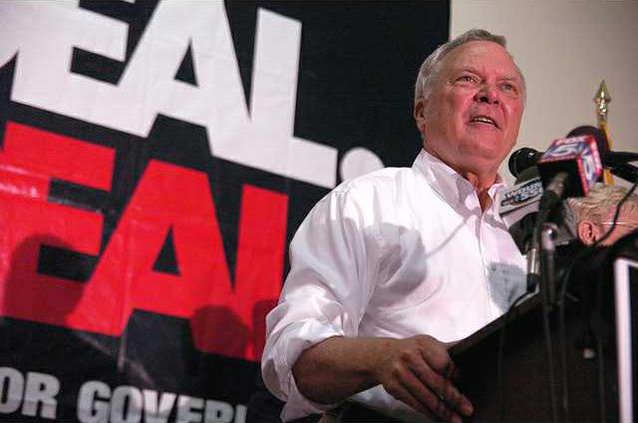Nathan Deal has at least three more weeks on the campaign trail after pulling together enough votes Tuesday night to force former Secretary of State Karen Handel into a runoff.
The two will go head-to-head Aug. 10 for the Republican nomination in Georgia’s governor’s race.
Until then, the former congressman from Gainesville says he plans to show the voters of Georgia that he is the “true conservative” who can beat Democratic nominee Roy Barnes in November.
Barnes, former Georgia governor, handily beat six other candidates seeking the Democratic nomination Tuesday night, with 66 percent of the vote.
Addressing supporters Tuesday night, Deal said he took comfort in the fact that a majority of voters took Republican ballots in Tuesday’s primary.
“I will be the candidate in the runoff who is the conservative who will carry that banner,” Deal said.
To win in the runoff, Deal has a significant amount of ground to cover in the next three weeks. On Tuesday, he finished 11 percentage points behind Handel, who won the most votes in metro Atlanta and several counties on the eastern edge of the state.
Handel — who’s running to become Georgia’s first female governor — called her lead against a field of six male opponents “a big milestone for women across this state.”
Handel surged to the top of the GOP pack with the support of former Alaska Gov. Sarah Palin, who vouched for her conservative credentials.
“We’re going to put an end to Roy’s political career once and for all,” Handel said.
Tuesday’s results were in opposition to most polls leading up to the election that showed Insurance Commissioner John Oxendine with a sure spot in the Republican runoff.
Oxendine finished fourth in Tuesday’s Republican primary, carrying south and middle Georgia counties that had little voter participation.
He gave a concession speech early in the night, well before Deal or Handel would officially address supporters.
“I’m not the first person to lose an election, and I won’t be the last,” Oxendine said. “I do love life, and I love Georgia.”
Deal said he is hoping supporters of other candidates in Tuesday’s primary will come over to his side, perhaps with the help of endorsements of candidates eliminated Tuesday.
“I think that will help us, because they have credibility within their own support group,” Deal said.
A coveted endorsement in the race seems to be that of former state Sen. Eric Johnson, who finished third in Tuesday’s primary. Johnson, a Savannah architect, carried key Southeast Georgia counties Tuesday.
“We’re certainly going to be proud of our efforts and what we’ve done,” Johnson said.
Over the next three weeks, Deal said he hopes to gain ground in areas outside of North Georgia. Deal, who represented much of North Georgia for 17 years in the U.S. House of Representatives, dominated voting in the northern reaches of the state. But he carried few counties south of metro Atlanta Tuesday.
Representatives of the campaign, celebrating in an airport hangar in Gainesville Tuesday night, said they’d be right back at the campaign office Wednesday morning in search of campaign donations.
The money, Deal said, will allow the former congressman to buy more television advertising and improve his name recognition in other parts of the state.
“We attack everywhere,” Deal said of his campaign strategy. “We’re not conceding any part of the state.”
Addressing supporters Tuesday night, Deal asked them to hold onto their energy for a few more weeks, calling the cheering crowd one of the most energized groups of people he had ever been around.
“It is your energy that has brought us to this point of being in the runoff,” Deal said. “We need you to continue. Don’t get tired on me, because I’m goin’ be up early in the morning. I’m starting all over again.”
While Deal and Handel cobble together conservative votes over the next three weeks, Barnes will get ready to face either one of them in November.
“They are both members of the team that brought Georgia to the place where we are right now,” Barnes said. “They are part of the team that gave tax breaks to special interests and then had to lay off teachers and shorten the school year to cover up their mistakes. Our children cannot afford that team any longer.”

